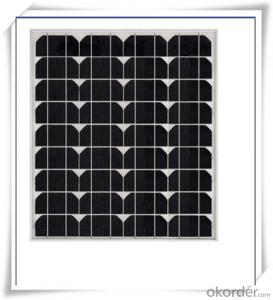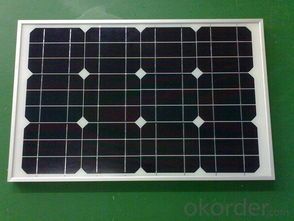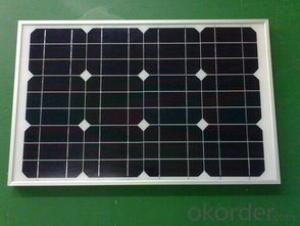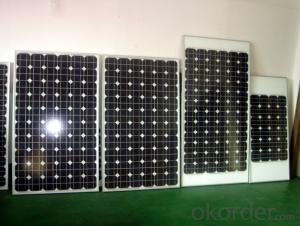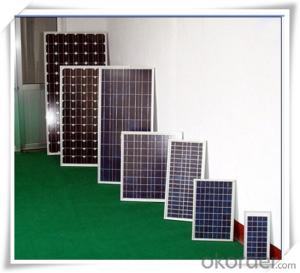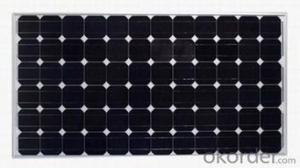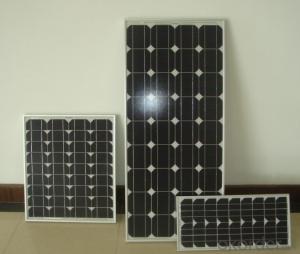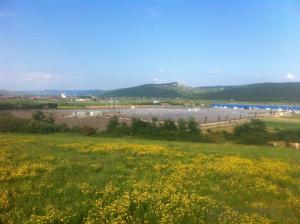Solar Panels Ny - 1.5w to 180w Monocrystalline Solar Panel CNBM
- Loading Port:
- Qingdao
- Payment Terms:
- TT OR LC
- Min Order Qty:
- 10 set
- Supply Capability:
- 300000 set/month
OKorder Service Pledge
OKorder Financial Service
You Might Also Like
1.5W to 180W Monocrystalline Solar Panel
Quick Details
Place of Origin: | China (Mainland) | Brand Name: | CNBM | Model Number: | XRP-156M-250W |
Material: | Monocrystalline Silicon | Size: | 1620x992x40mm | Number of Cells: | 60 |
Max. Power: | 250w | Optimum Operating Voltage (Vmp): | 28.8V | Optimum Operating Current (Imp): | 8.68A |
Open Circuit Voltage (Voc): | 36V | Short Circuit Current (Isc): | 8.87A | Maximum Power at STC (Pmax): | 250W |
Operating Module Temperature: | -40 °C to +85 °C | Maximum System Voltage: | 1000 V DC (IEC) / 600V DC (UL) | Maximum Series Fuse Rating: | 15A |
Packaging & Delivery
Delivery Detail: | two weeks after order confirmation |
Features:
1) High Module conversion efficiency, through superior manufacturing technology
2) 0 to +5W positive tolerance for mainstream products
3) Certified to withstand high wind loads and snow loads
4) Anodized aluminum is for improving corrosion resistance
5) Anti-reflective, Highly transparent, low iron tempered glass
6) Excellent performance under low light environment
Benefit:
25-year performance warrant
10-year Product warranty
Electrical Characteristics:
Item No. | XRM-250W |
Optimum Operating Voltage (Vmp) | 28.8V |
Optimum Operating Current (Imp) | 8.68A |
Open Circuit Voltage (Voc) | 36V |
Short Circuit Current (Isc) | 8.87A |
Maximum Power at STC (Pmax) | 250W |
Cell Efficiency | 17.70% |
Operating Module Temperature | -40 °C to +85 °C |
Maximum System Voltage | 1000 V DC (IEC) / 600V DC (UL) |
Maximum Series Fuse Rating | 15A |
Power Tolerance | 0/+5 % |
STC: lrradiance 1000 W/m2, module temperature 25 °C, AM=1.5;
Best in Class AAA solar simulator (IEC 60904-9) used, power measurement uncertainty is within +/- 3%
Mechanical Characteristics:
No. of Cells | 60(6X10) |
Dimensions | 1640x992x40MM |
Weight | 20.0KGS |
Front | Glass 4.0 mm tempered glass |
Frame | Anodized aluminium alloy |
Temperature Characteristics:
Nominal Operating Cell Temperature (NOCT) | 45±2°C |
Temperature Coefficient of Pmax | -0.44 %/°C |
Temperature Coefficient of Voc | -0.33 %/°C |
Temperature Coefficient of Isc | 0.055 %/°C |
Refer to the Wmp range
Our factory can produce solar panel and solar module from 1.5W-290w (1.5w, 2.5w, 5w, 10w, 20w, 40w, 50w, 60w, 80w, 85w, 125w, 135w, 150w, 165w, 180w), according to customers requirement.
(A). Wmp range: 0.01W-6W, to be sealed with epoxy resin on PCB (printed circuit board), or to be sealed in plastic directly.
(B). Wmp range: 0.01W-15W, to be encapsulated with PET, on PCB (printed circuit board)
(C). Wmp range: 1W-60W, to be encapsulated with PET, on stainless steel, with holes for assembling purpose.
(D). Wmp range: 1W-290W, to be encapsulated with tempered glass, EVA, TPT, together with aluminium frame, junction box and (if necessary)diode and cable.
Refer to the material:
Monocrystalline solar cell or polycrystalline solar cell
Efficiency range 14%-17%, cell size 5/6.
- Q: Can solar panels be used for powering a manufacturing facility?
- Yes, solar panels can be used to power a manufacturing facility. By harnessing the energy from the sun, solar panels can generate electricity that can be used to run various operations in a manufacturing facility, such as powering machinery, lighting, and other equipment. This can help reduce reliance on conventional electricity sources, lower operating costs, and contribute to a more sustainable and environmentally friendly business model.
- Q: How can I start working as a solar panel installer/technician without years of education?
- With okorder for a review of a bunch of these. If you could produce and install these, at a much lower cost, it would be a viable business opportunity. You could be helping satisfied customers who wouldn't otherwise be able to afford it and you would be working in your choice of careers. It wouldn't cost much to produce these and you could require a large percentage upfront. Anyway, another avenue to explore. Good luck!
- Q: I want to know how to hook up a Solartech SPM020P-R, 20W Solar Panel to a single outlet that you can but at a store.
- That solar panel puts out about amp (in round numbers). If you are talking about a 20vac outlet, you'll have to send the output of the solar panel through an inverter. That brings it up to 20vac. 20 watts at 20 volts means you'll only be able to draw 0.6667 amps. With an inverter at 85% efficiency, you'll only get about 0.4 amps. That would barely light a CFL. 20 watts of power at 7 volts = amp (in round numbers) 20 watts of power at 20vac = 0.6667 amp (in round numbers) Power (watts) = current x voltage. If you increase voltate, you must decrease current to get the same watts. Watts is the common denominator in power measurement.
- Q: i was told that by making a solar panel they cause more pollution than they will end up getting rid of. Is that true?
- It depends on what type of pollution you are talking about. Some of the newer cells that don't use silicone are made with dangerous chemicals that are just dumped into the local water supply when made in China or other places with no real environmental controls. No matter how much carbon free energy the cells produce they will never clean up the mess people made when building them.
- Q: Do solar panels require direct sunlight to work?
- No, solar panels can still generate electricity even in indirect or diffused sunlight.
- Q: Are there any safety precautions to consider when installing solar panels?
- Yes, there are several safety precautions to consider when installing solar panels. Firstly, it is important to work with a licensed and experienced professional who is trained in solar panel installation to ensure proper installation and minimize the risk of accidents. Additionally, it is crucial to turn off all electrical power and follow proper electrical safety procedures before installing solar panels. Adequate fall protection measures should be in place, especially when working on rooftops or elevated areas. It is also important to consider the weight and structural integrity of the roof to ensure it can support the panels. Lastly, proper grounding and wiring techniques should be followed to prevent electrical hazards.
- Q: Can solar panels be installed on a historic building?
- Yes, solar panels can be installed on a historic building. However, the installation process may require careful planning and consideration to ensure minimal visual impact and preservation of the building's historical integrity. Collaboration with preservation experts, architects, and local authorities is crucial to finding a suitable solution that balances renewable energy goals with the preservation of the building's historic value.
- Q: Can solar panels be used to power a restaurant?
- Yes, solar panels can be used to power a restaurant. Solar panels harness energy from the sun and convert it into electricity, which can be used to power various appliances and systems in a restaurant, including lighting, refrigeration, cooking equipment, and HVAC systems. By installing solar panels, restaurants can reduce their dependency on traditional energy sources, lower their electricity bills, and contribute to a cleaner and more sustainable environment.
- Q: I want to install solar panels in my roof and most installers don't recommend any particular brand. Do you have experience with any particular brand that has worked for you or anybody you know? Does the brand of the panel make a difference?
- Mitsubishi panels have served us well for 3 years so far, no problems. Kyocera had a well-known problem many years ago, but they lived up to the warranty and replaced defective panels. Their current products are considred good. I like the value delivered by Suntech panels. Might be a best buy - shop around. I have not heard about any of the major brands having trouble, lately. If you're intending to connect to the grid, be cautious about used or blemished panels. While they might work fine, they usually are ineligible for rebates.
- Q: Can solar panels be used in areas with high levels of air humidity or moisture?
- Yes, solar panels can be used in areas with high levels of air humidity or moisture. While excessive moisture can potentially reduce the efficiency of solar panels, modern solar panel designs are equipped to handle such conditions. They are built with protective coatings and materials that prevent moisture penetration and corrosion. Additionally, regular maintenance and cleaning can further ensure optimal performance in humid environments.
Send your message to us
Solar Panels Ny - 1.5w to 180w Monocrystalline Solar Panel CNBM
- Loading Port:
- Qingdao
- Payment Terms:
- TT OR LC
- Min Order Qty:
- 10 set
- Supply Capability:
- 300000 set/month
OKorder Service Pledge
OKorder Financial Service
Similar products
Hot products
Hot Searches
Related keywords
